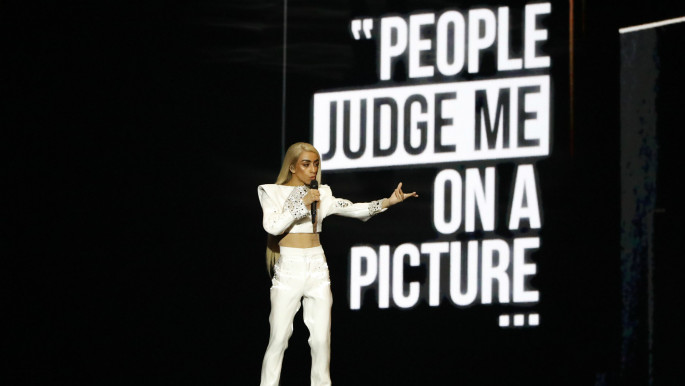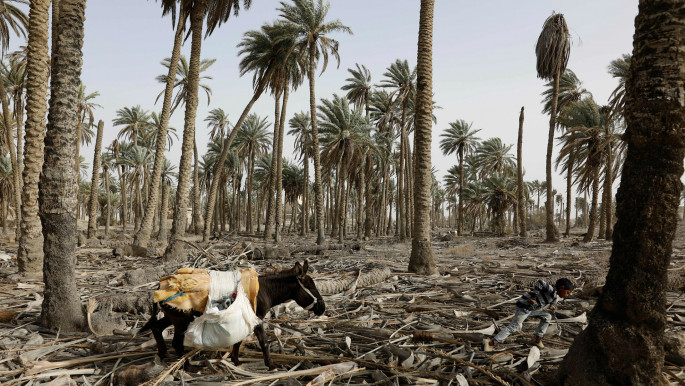How Israel uses animal rights to 'veganwash' the occupation
Israel has long been accused of "pinkwashing" – the practice of whitewashing or obscuring the abuse and maltreatment of the Palestinian people behind an often embellished version of its record on LGBTQ+ rights.
It presents itself as a forward-thinking, liberal democracy – the only state in the Middle East which respects its LGBTQ+ citizens. This gives the impression that it simply isn't in Israel's nature to violate Palestinian human rights or national sovereignty.
The Palestinian Animal League and Israeli veganwashing
Palestine and Palestinians are then cast, without nuance or exception, as the polar opposites of Israel and Israelis – backwards, illiberal, undemocratic, homophobic. Who then are the international community and well-intentioned private citizens to believe and support?
Ahmad Safi is the co-founder of the Palestinian Animal League (PAL). PAL is a collective of animal rights activists operating throughout the West Bank. They are also ardent advocates of Palestinian self-determination.
 |
|
| Read also: Eurovision brings Israel's record on LGBT+ rights to the forefront |
PAL previously operated the first vegan café in the Arab world and, amongst other projects, works with the City of Tulkarm on a trap, neuter, vaccinate, and release (TNVR) programme for stray dogs.
For Safi, the successful propagation of the Israeli pinkwashing narrative has spawned what he terms "veganwashing."
"The Israelis are using veganism and animal rights to clean up their image around the world," Safi told The New Arab.
This time, an animal-loving depiction of Israel is juxtaposed with a view of Palestine as a haven for animal abuse. And just as with pinkwashing, Israel's track record on animal rights is not quite as rosy as one might be led to believe.
Whilst it is true that vegan cafés line the streets of Tel Aviv, Israel is far from the vegan paradise many Israeli animal rights activists paint it as.
 |
The Israelis are using veganism and animal rights to clean up their image around the world |  |
In fact, according to an OECD report published earlier this year, Israel is the sixth biggest per capita consumer of meat and the number one per capita consumer of poultry.
Moreover, The Guardian has documented the horrific treatment experienced by farm animals subjected to live export from Australia and Europe to Israel.
The squalid, unsanitary conditions aboard the boats and trucks which bring these animals to their final destinations are torturous. Those who have perished or will soon perish are unceremoniously dumped and left to decompose throughout the desert.
Palestinian national emancipation and intersectionality
It is here that Palestinian national emancipation enters the debate. Safi remarks that PAL is keen to dispel Israeli veganwashing propaganda. In demonstrating that "it is not just Israelis and Europeans who are leading this fight," but Palestinians too, PAL advances the Palestinian national cause. The example provided by their activism shatters the illusion that they and their fellow citizens are inherently regressive in comparison to the Israelis.
 |
|
| Read also: Companions in Conflict: Animals in Occupied Palestine |
But animal rights are not merely a vehicle for achieving national emancipation – they are part and parcel of the same struggle.
In the words of PAL's Executive Director, Ahlam Tarayra, "It's not enough to raise the Palestinian flag. If you want to liberate your land, you need to work on building a strong society that cares for all who inhabit it. Palestine is the people, the animals, the plants, everything."
This is a succinct expression of PAL's intersectionality – a philosophy which posits that all liberation struggles are inextricably linked.
Perhaps the clearest-cut evidence for PAL's intersectional position comes in the form of the so-called Separation Wall, which PAL refers to as the 'Apartheid Wall.'
The Apartheid Wall does not discriminate between species: Palestinian farmers are cut off from their land, while other mammals are prevented from observing their natural migratory patterns. Furthermore, just as Palestinian human families are ripped apart, so too are the red fox and the gazelle separated from their mates.
"Does he have a vegan machine gun, with vegan bullets?"
PAL's activists note yet further inconsistencies within the veganwashed narrative on Israeli attitudes towards animals.
As far as their organisation is concerned, veganism is not just a diet. It is an ethical way of life, based on the principle that violence against, and the suffering of all animals – including humans – are evils to be fought against.
How then can the IDF be 'the most vegan army in the world' when it is complicit in unspeakable violence against the Palestinian people?
 |
How then can the IDF be 'the most vegan army in the world' when it is complicit in unspeakable violence against the Palestinian people? |  |
Moreover, just as with the Apartheid Wall, it is not just Palestinian humans who find themselves victimised by the IDF.
Safi reports witnessing many occasions where Israeli soldiers have shot and killed stray dogs who attempted to play with their military dogs while on their way to conduct raids in his refugee camp.
Given the violence and oppression the Israeli state represents to PAL, the group refuses to work with Israelis until such a time as Palestine is free.
Safi and Tarayra both separately recounted a story in which a woman repeatedly pleaded with them to collaborate with a vegan IDF soldier to bring three puppies to an animal shelter. Tarayra in particular was shocked at the idea that this soldier could properly be described as a vegan. "Does he have a vegan machine gun, with vegan bullets?" she enquired.
When the woman threatened to write negative reviews online about PAL's refusal to work with the soldier to help the puppies, the group justified their decision with reference to their ideals of national liberation. They believe that collaborating with IDF soldiers normalises their presence in Palestine and therefore further entrenches the occupation – and the violence that it entails. From this vantage point, in the long term, working with the soldier would have only served to worsen the situation for all.
The Palestinian Animal League seeks to bring about a world in which they and all those who share their country might live life in liberty and peace.
Nick McAlpin is a freelance journalist from London. He is currently a Cambridge UK Masters scholar on the University of Cambridge's MPhil Social Anthropology programme, where he focuses on the intersection of animal rights, nationalist, and feminist activisms in Palestine.
Follow him on Twitter: @NickGMcAlpin







